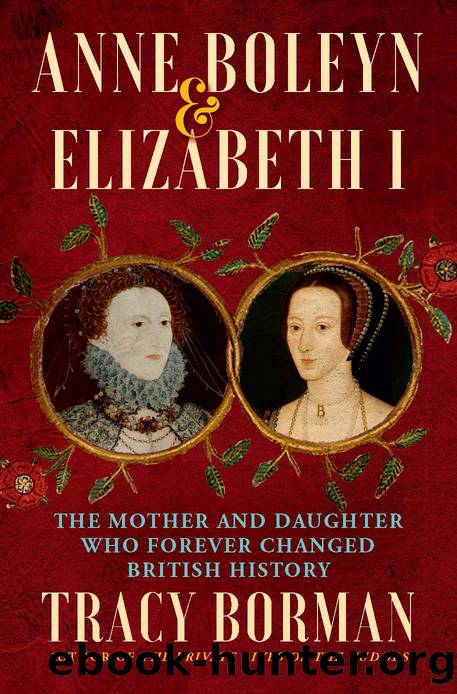Anne Boleyn & Elizabeth I by Tracy Borman

Author:Tracy Borman
Language: eng
Format: epub
Publisher: Grove Atlantic
If this was an open invitation for Elizabeth to patronise such a work, she did not take him up on it. Neither is there any evidence that she acted on Alesâs hint that he might be rewarded for his letter â he even included an address for any financial gifts to be sent. But his words had left a profound impression on the new queen, stoking her already fierce loyalty towards her late mother. It also strengthened her determination to avenge Anneâs death by firmly establishing the religion of which her mother had been such a passionate advocate.
Elizabethâs accession had sparked a flurry of celebratory prose among Protestant writers, all rejoicing that at last Godâs will would be done. They were also quick to praise Anne Boleyn as the inspiration for the new queenâs reformist beliefs. John Foxe, whose Acts and Monuments first appeared in 1559, proclaimed: âWhat a zealous defender she was of Christâs gospel all the world doth know, and her acts do and will declare to the worldâs end.â He also hailed Elizabethâs accession as âthe evident demonstration of Godâs favourâ towards Anne Boleyn âin maintaining, preserving, and advancing the offspring of her body, the lady Elizabeth, now queenâ.20 Other Protestant writers eagerly drew comparisons between the religious stance of the new queen and that of âQueen Anne the mother of this blessed womanâ. John Aylmer, who had fled to Switzerland during Maryâs reign and returned to England as soon as he received news of Elizabethâs accession, praised Anne as âthe crop and rootâ of the English Reformation.21 It was a theme that continued throughout Elizabethâs reign. Writing in the 1570s, John Bridges described Anne as âa sweet sacrifice to God and a most holy martyrâ whom Henry VIII had unjustly put to death, while Ralph Holinshed referred to her âzeal of religionâ.22
William Latymer, formerly chaplain to Anne Boleyn, presented Elizabeth with an essay praising her motherâs virtues in general and her religious activities in particular.23 Latymer had suffered for his association with the fallen queen and had been arrested for importing heretical books from Flanders on her behalf. Anne had been unable to intercede for him because by then she was in the Tower, awaiting death. Upon Maryâs accession, he had lost all his preferments because of his Protestant faith, but Elizabeth restored these to him when she became queen. In his âCronickille of Anne Bulleyneâ, he began by drawing a direct comparison between mother and daughter: âWhen I considered with myself ⦠the manifold gifts of nature and virtuous qualities which set forth and magnify your royal name, I could not but remember the excellent virtues, and princely qualities wherewith your majestyâs dearest mother, the most gracious lady, queen Anne, was adorned and beautified in the time of his majestyâs noble reign.â As one of only a few people known to Elizabeth who could remember her mother, Latymer declared his determination âthat the same might not be utterly forgotten, but be commended to immortal memoryâ.
Download
This site does not store any files on its server. We only index and link to content provided by other sites. Please contact the content providers to delete copyright contents if any and email us, we'll remove relevant links or contents immediately.
| General | Channel Islands |
| England | Northern Ireland |
| Scotland | Wales |
Room 212 by Kate Stewart(5123)
The Crown by Robert Lacey(4817)
Endurance: Shackleton's Incredible Voyage by Alfred Lansing(4783)
The Iron Duke by The Iron Duke(4356)
The Rape of Nanking by Iris Chang(4213)
Joan of Arc by Mary Gordon(4113)
Killing England by Bill O'Reilly(4004)
Say Nothing by Patrick Radden Keefe(3987)
I'll Give You the Sun by Jandy Nelson(3448)
Shadow of Night by Deborah Harkness(3368)
Hitler's Monsters by Eric Kurlander(3343)
Mary, Queen of Scots, and the Murder of Lord Darnley by Alison Weir(3210)
Blood and Sand by Alex Von Tunzelmann(3205)
Eleanor & Park by Rainbow Rowell(3176)
Darkest Hour by Anthony McCarten(3133)
Margaret Thatcher: The Autobiography by Thatcher Margaret(3082)
Book of Life by Deborah Harkness(2939)
Red Famine: Stalin's War on Ukraine by Anne Applebaum(2934)
The One Memory of Flora Banks by Emily Barr(2863)
